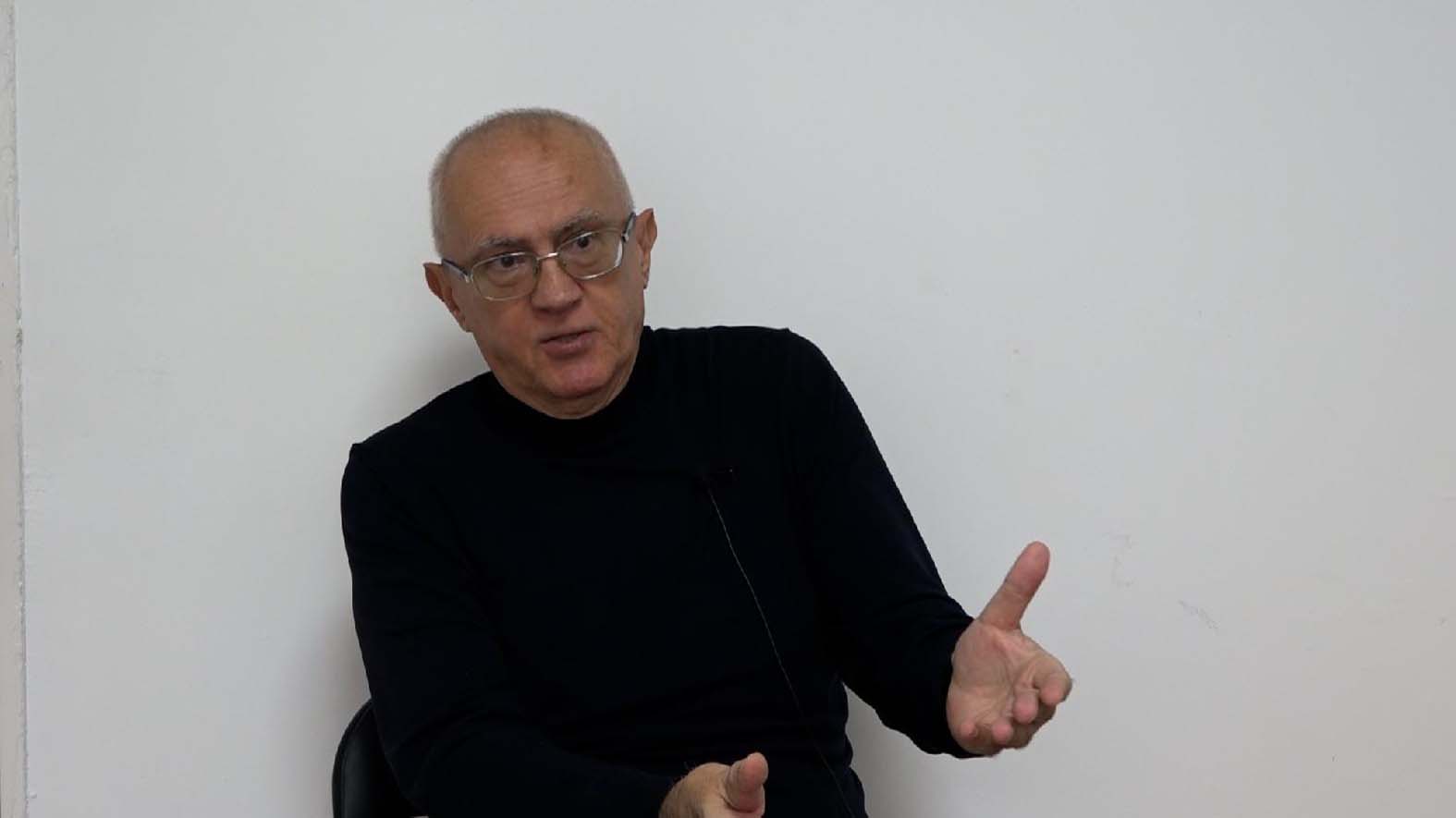In an unclear world, unrestrained nuclear competition threatens
/s3/static.nrc.nl/images/gn4/stripped/data131037801-a48170.jpg|https://images.nrc.nl/8TN8_cuDWvW2D9gZV6QbiQZvZIs=/1920x/filters:no_upscale()/s3/static.nrc.nl/images/gn4/stripped/data131037801-a48170.jpg|https://images.nrc.nl/c9adnqQishsD-1HeGvP2Vfpn-i4=/5760x/filters:no_upscale()/s3/static.nrc.nl/images/gn4/stripped/data131037801-a48170.jpg)
Barack Obama was only a president for a few months when he greeted an enthusiastic crowd in the center of Prague with Michelle Obama. April 2009. Europe was still under the spell of Obama magic. The new president was still full of ideals.
« Today I clearly and with conviction I explain the effort of America to pursue peace and safety in a world without nuclear weapons, » he said halfway through his speech. The Czechs immediately started cheering.
Sixteen years later, optimism about international relationships is no longer the case. The world is unclear, the tone is aggressive and the worries about nuclear weapons have increased. Nuclear arsenals are modernized and expanded. Weapon control is dying after death. The relationships between the nine nuclear weapons in the world are complex and in a number of cases antagonistic. New conventional weapons, new technology such as AI and militarization of space ensure even more uncertainty.
We live in a « new and challenging era of multipolar nuclear competition against the background of rapid technological changes, » writes Ankit Panda, researcher at think tank Carnegie in a new book: The New Nuclear Age: At the Precipice of Armageddon.
And then there is Donald Trump. His authoritarian style and the unabashed dedain for legal rules, international cooperation and decency standards have robbed allies in Asia and Europe of their most important anchor in the world in a short time. The future of military cooperation with the US and the economic relationship is uncertain after a series of Trump shocks.
In Asia and in Europe, people are therefore wondering what the traditional nuclear security guarantees of the US are still worth, just at a time when Russia wages war against Ukraine and China in the world more and more emphatically shuns power display in their own region.
Financial burden
Take the US allies Germany and South Korea. In Seoul is thought out loud About its own nuclear weapon in case the US withdraws their men. The intended new German Chancellor Friedrich Merz wants to think about French and British nuclear protection, In addition to the American. In Poland, the Prime Minister is in favor of a European solution, but asked the president for stationing American nuclear weapons.
Trump often talks about the financial burden of the nuclear arsenal. Why, he wondered, should the US invest dozens of billions every year in weapons that if they are ever used lead to the destruction of the earth? Where proponents of armament see a system of deterrence that has worked for 75 years, Trump sees a poor investment.
Trump not only has an obsession with import duties, but also nuclear weapons have been keeping him busy for half a life. In the mid -eighties, then a young project developer on Manhattan, he asked President Ronald Reagan if he could lead the American team in the arms negotiations. In his first term, he caused a lot of time by negotiating twice with the North Korean leader Kim Yong-un over his nuclear weapons, incidentally without results.
In his first term, Trump also left the nuclear deal in which the West agreed with Iran that Tehran would minimize his atom program in exchange for reducing economic sanctions. Where Europeans saw a triumph of diplomacy – the agreement had been worked on for more than ten years – Trump saw « the worst deal ever ».
Where proponents of armament see a system of deterrence that has worked for 75 years, Trump sees a poor investment
Tehran caught the one -sided cancellation by Trump as betrayal. After European attempts to save the agreement, Iran re -performed its atomic activities.
Trump has not only asked his old real estate buddy Steve Witkoff to open peace talks with Vladimir Putin, but also asked him to negotiate with Tehran about the Iranian atomic program in between. Last weekend a second conversation round took place in Rome, this week the conversations will take place. The US wants to adjust the power relationships in the Middle East and support ally Israel. At the same time, they would prove the world if it is prevented that Iran is developing into the tenth nuclear state.
Rose Gottemoeller, under Obama charged with negotiations on weapon control, Trumps takes nuclear aversion seriously And keeps him his word. « The president’s interest is a happy coincidence, » she wrote Foreign Affairs. « In the midst of the turbulence of his government, Trump’s tendency to nuclear reluctance can motivate him to negotiate real restrictions – at a time when the world desperately needs such measures. »
70,000 nuclear heads
Since the first nuclear explosion, the Trinity test of Oppenheimer, the world lives with the question of whether humanity can control the devastating power of atomic split. The bombs on Hiroshima and Nagasaki in 1945 did not lead to a global moratorium, but to an insane arms race. Four years after the US, the Soviet Union also had a nuclear bomb. In 1986 the core powers had together More than 70,000 nuclear heads.
With the end of the Cold War, a new era also started for nuclear weapons. The immense Arsenals of the US and Russia were shot. A number of former Soviet states, including Ukraine, gave up their nuclear weapons. North Korea, on the other hand, attracted attention because it aspired to a nuclear weapon to parry the threat from South Korea, where American weapons were stationed. In the nineties, analysts and politicians were mainly concerned about terrorist attacks with a dirty bomb – a conventional bomb with radioactive material. But the post-cold war period was mainly characterized by the hope that a nuclear-free world was feasible.
« Yes we can, » said Obama in Prague.
For about four years, the world has been described in some Panda as a new and pessimistic nuclear era. The new aggressiveness of Russia in Ukraine was accompanied by a reinforced bond between Moscow and Beijing. Animosity between China and the US has been unmistakable since the first reign of Trump. Since last week, China and the US are also involved in a bitter trade conflict that the two superpowers can drive further apart.
The most important change on the nuclear playing field is that China has drastically increased its ambitions. After a first successful nuclear test in the 1960s, China initially built a modest arsenal of more than 200 nuclear weapons, which, explained Beijing, only had a defensive function.
In the summer of 2021, researchers on satellite images found that China was digging new silos for intercontinental rockets, to be relaxed with one or more nuclear loads. Since last year, the US has assumed that in ten years, China will have 1,500 nuclear heads -Panda warns that there is still the necessary uncertainty about Chinese intentions.
Read also
Can Europe without the Nuclear umbrella of the US? Strength and weaknesses of a European core power
With 1,500 core heads, China Numeric would still be far behind the US and Russia, given their arsenals of 3,700 and 4,300 nuclear heads respectively. But if the two old superpowers adhere to existing agreements, they will only mount 1,550 on carriers and keep the rest in stock. If China then used his entire stock, Beijing will be at the same level within ten years.
Three enemies at the same time
Previously, the US more or less took up the small Chinese problem. Washington has abandoned that long -suffering. The US now has not one but two nuclear competitors. And that’s not all. The threat based on North Korea is also taken more seriously.
President Biden already adjusted the formal instruction for the nuclear defense. The armed forces must be prepared for « simultaneously scare Russia, China and North Korea, » he wrote in one new guideline. The nuclear weapon arsenal, soldiers say, must be adapted to that new task.
:format(jpeg):fill(f8f8f8,true)/s3/static.nrc.nl/images/gn4/data131048243-34edbe.png|https://images.nrc.nl/rFNNWoLao_sS-FtgxHS4T0cgOCQ=/1920x/filters:no_upscale():format(jpeg):fill(f8f8f8,true)/s3/static.nrc.nl/images/gn4/data131048243-34edbe.png|https://images.nrc.nl/s6Cwu2NsGmMQXvbs8LmGSG-Zq98=/5760x/filters:no_upscale():format(jpeg):fill(f8f8f8,true)/s3/static.nrc.nl/images/gn4/data131048243-34edbe.png)
The US has been modernizing their nuclear infrastructure for years. In ten years it costs around $ 756 billion. The US has three carriers for their nuclear heads: they can be transported with intercontinental rockets that are fired from land, with rockets launched from nuclear submarines and with long-distance bombers. Both the rockets and the submarines and the bombers are being replaced.
General Anthony Cotton, commander of Strategic Command (Stratcom), said last month that the new geopolitical situation requires more equipment. For example, he does not want 100 new B21 bombers, but 145. The fleet of new submarines should also be expanded and more new cruise missiles should be purchased than foreseen, according to Cotton. The plans for modernization date from the ten, before China increased its ambition.
Consultation
Is it feasible in a world of multipolar competition to make agreements about arms control? In the Bipolar Cold War, consultation between the US and the Soviet Union was extremely successful. Nuclear weapons states promised to prevent the spread of nuclear weapons (proliferation), testing was only allowed underground, nuclear weapons were destroyed on a large scale and under mutual supervision.
Many crash barriers from the time have now been removed or are becoming less relevant. The non-proliferation agreement is still standing, although it will be In the US claimed That Russia shares technical knowledge with Iran and North Korea and supplies plutonium to China. Testing nuclear weapons was further restricted in the 1990s, although the International Convention on this never came into force because not all countries ratified it, including the US. Russia left the treaty in 2023.
After the Cubacrisis of 1962, when the US and the Soviet Union came close to a nuclear confrontation, Washington and Moscow remained in contact about nuclear weapons, no matter how difficult the ratio in other areas became. After the Russian invasion of Ukraine, the consultation stopped.
Read also
There is also a threat of a country that can make nuclear weapons, says this American researcher
Russia said in 2023 that it would no longer adhere to the last major weapon control treaty with the US, NewStart, as long as the US supports Ukraine. It is conceivable that in the margin of the discussions about Ukraine, nuclear issues will again come to the table. In principle, Trump and Putin still have ten months to save the treaty: it will be without intervention in February 2026.
According to Obama’s arms negotiator Gottemoeller, consultation between the US and Russia does not have to be too complicated. They have sixty years of experience with each other. Putin said this year that he wants to talk about NewStart. In the confrontation about the Russian attack on Ukraine, Trump always chooses the side of Russia.
China is a more difficult case for the US. Both Trump and Biden have tried to involve China in conversations about reducing weapons, but Beijing refused because it has many fewer weapons. Moscow and Washington first have to reduce their arsenal, says Beijing. Conversations with China should therefore not be about reducing weapons, but about openness and better communication, Gottemoeller suggests. Whether it will come that far during the crackling trade war at all can be seen.
Ultimately, analyst Panda, it can only come to meaningful conversations if the opponents recognize for themselves and to each other that they have a common interest to survive in the shadow of unrestrained nuclear competition. « That fundamental condition is not met now. »

:format(webp)/s3/static.nrc.nl/wp-content/uploads/2025/04/04111243/data130287438-072114.jpg)
:format(webp)/s3/static.nrc.nl/bvhw/files/2025/04/data129950434-cc78dc.jpg)
:format(webp)/s3/static.nrc.nl/images/gn4/stripped/data132512191-bf7b93.jpg)
/s3/static.nrc.nl/images/gn4/data133305174-ec8c91.jpg)



